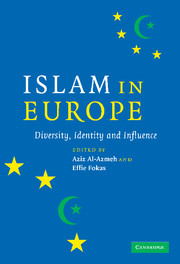Book contents
- Frontmatter
- Contents
- List of figures
- List of contributors
- List of abbreviations
- Preface
- 1 Introduction
- 2 Christians and Muslims: memory, amity and enmities
- 3 The question of Euro-Islam: restriction or opportunity?
- 4 Muslim identities in Europe: the snare of exceptionalism
- 5 From exile to diaspora: the development of transnational Islam in Europe
- 6 Bosnian Islam as ‘European Islam’: limits and shifts of a concept
- 7 Islam in the European Commission's system of regulation of religion
- 8 Development, discrimination and reverse discrimination: effects of EU integration and regional change on the Muslims of Southeast Europe
- 9 Breaching the infernal cycle? Turkey, the European Union and religion
- 10 Afterword
- Index
- References
9 - Breaching the infernal cycle? Turkey, the European Union and religion
Published online by Cambridge University Press: 05 June 2012
- Frontmatter
- Contents
- List of figures
- List of contributors
- List of abbreviations
- Preface
- 1 Introduction
- 2 Christians and Muslims: memory, amity and enmities
- 3 The question of Euro-Islam: restriction or opportunity?
- 4 Muslim identities in Europe: the snare of exceptionalism
- 5 From exile to diaspora: the development of transnational Islam in Europe
- 6 Bosnian Islam as ‘European Islam’: limits and shifts of a concept
- 7 Islam in the European Commission's system of regulation of religion
- 8 Development, discrimination and reverse discrimination: effects of EU integration and regional change on the Muslims of Southeast Europe
- 9 Breaching the infernal cycle? Turkey, the European Union and religion
- 10 Afterword
- Index
- References
Summary
There is something boring about discussing the candidacy of Turkey for membership in the European Union (EU). Reading the vast literature on the topic, it seems the discussion leads either to technical, petty and bureaucratic analysis of reforms, change and prospects for adapting Turkish institutions to European requirements (all with an implicit motto of ‘Turkey can do it’), or, on the contrary, it ends up with an accumulation of stereotypes and cultural and essentialist illustrations of how trying to merge Turkey into Europe is nonsense (the subliminal message being ‘don't do it!’). In this second category, the core argument is more explicitly related to the identity dimension of the European Union construction. Even if some observers have mentioned the centrality of identity politics and religion in this discussion (at least, in their efforts to explain the passionate nature of the positions adopted by the various actors), the particular question of religion remains for the time being implicit rather than explicit. The Pandora's box of the discussion on EU cultural borders and EU religious identity has not yet been properly opened.
United in diversity: this is what Europe supposedly stands for. And indeed, in terms of religion, approximately 15 million Muslims are said to be living in the EU. As recently pointed out by Olivier Roy, the reason why Europeans are discussing Islam so intensively is directly linked with the fact that Muslims chose to leave the Middle East.
- Type
- Chapter
- Information
- Islam in EuropeDiversity, Identity and Influence, pp. 183 - 207Publisher: Cambridge University PressPrint publication year: 2007
References
- 2
- Cited by



